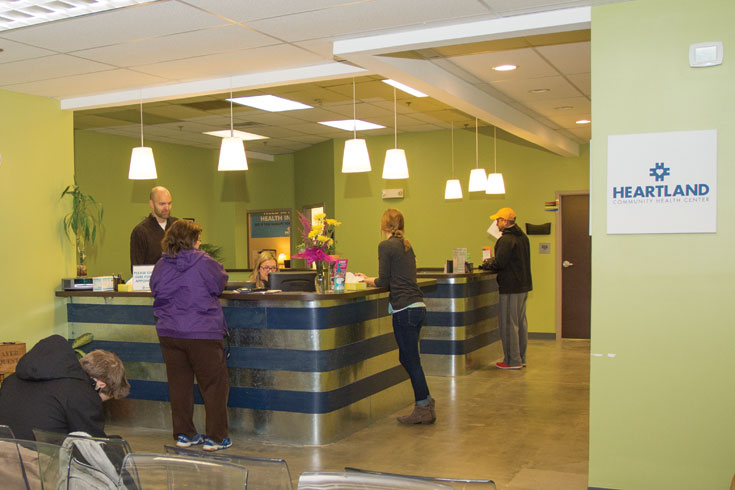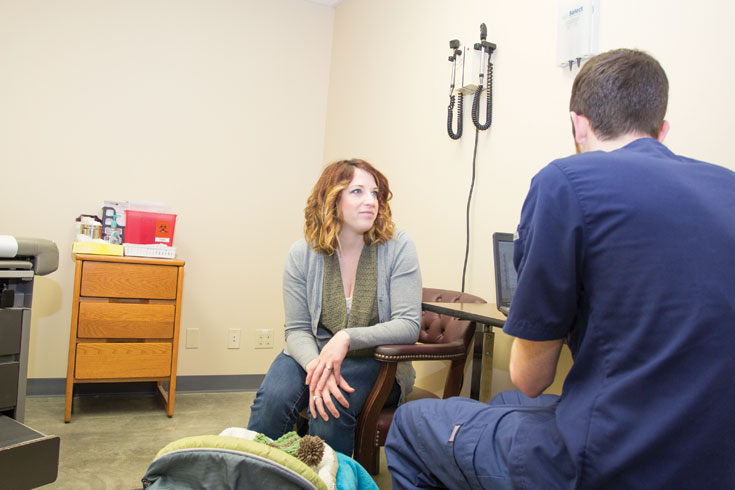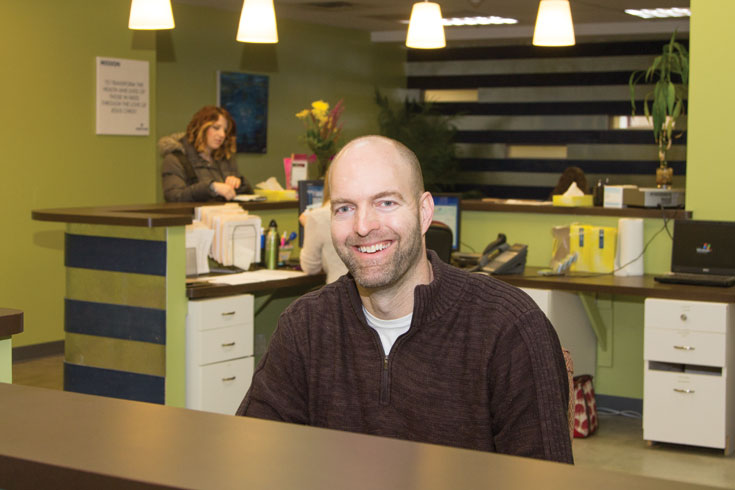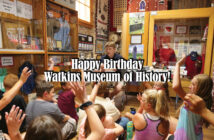| 2015 Q1 | story by TARA TRENARY | photos by STEVEN HERTZOG |

Jon Stewart, CEO of Heartland Community Health Center, stands behind the desk surveying the day-to-day tasks at Heartland; Lydia Benda, in charge of Patient Services, sits behind the desktop computer checking a patient in; and Ali Edwards, Director of Operations, stands in front of the counter assisting Benda with patient check-in.
Ericka Cole has suffered from depression and anxiety for much of her life, but she didn’t know it until recently. Because she is uninsured, she had been seeing a doctor at another clinic. But her needs weren’t being met there.
When someone told Cole about Heartland Community Health Center, she was leery because of patient fees, but chronic health issues pushed her to take the leap. And she’s certainly glad she did.
“It’s been well worth it. The level of attention and time I receive has been great,” Cole said. “It’s the best clinic I’ve been to. It has given me the ability to feel like I’m in charge of my own health and well-being. They do a lot to support our community in so many ways. They go far beyond what a typical doctor’s office does normally.”
Heartland Community Health Center is a nonprofit primary health care provider that services Douglas County and small portions of surrounding counties. Its clinic offers quality, affordable primary care to all community members, regardless of income or insurance status. It’s a so-called “family doctor” but also dedicates itself to practicing holistic, integrated health care, a model that focuses on physical health as well as emotional, social and spiritual health. Heartland provides a medical home for its patients by offering accessible, coordinated and compassionate care to ensure all their needs are met.
“We engage people in their own health in a system that doesn’t always operate that way,” CEO Jon Stewart said. “We hear a lot when people come through the door. We help them navigate the system very broadly and direct them to those services [they need]. We want to be their go-to person.”
As part of its “integrated health care model,” Heartland not only offers its patients medical care for all immediate physical needs but also emotional health care screening and counseling; diabetes care and prevention; a free wellness program to help patients make healthy lifestyle choices; a smoking-cessation program; a women’s health program for women aged 40 to 64; a medication-assistance program to help with the skyrocketing costs of prescription medications; a food pantry and a rent- and utility-assistance program.
“They work with you to get stable and then improve your condition,” said Liz Lanphear, Adult Education Program Coordinator at Johnson County Community College and current Heartland board member and patient. “They’re involved in you getting better versus just treating your symptoms. They help the whole person.”
Heartland was founded by Dr. Dennis Sale in the late 1990s. He had been part of a mobile medical clinic for migrant farm workers in California, and when he moved to Lawrence, he began offering a free clinic in a local church on Saturday mornings. Some local pastors soon got together and formed a board, and in 2004, the organization was formed. From 2004 to 2012, Heartland used part-time paid employees and volunteers, and relied fully on donations and grants. In 2012, Heartland became federally funded and went from a $600,000-a-year organization to more than $2 million a year. Only a few thousand patient visits a year suddenly jumped to a target of more than 12,000, and that number is still growing.

Jillian Hatch with Americorp member, Jason Molde, as he registers Hatch as a new patient.
Heartland is “still not meeting the full need,” Stewart says, adding that 30,000 people in the immediate area could be using Heartland services, but are not.
“They are scared to death to engage in the system,” he explains. “We aren’t here to change anyone. We are here to help people who don’t have options. Most people believe poor people want to take as much as they can, but that’s not what we see. Most people are so grateful for what we do. They are surprised by how much we care. Our goal is to let people know we care.”
Heartland currently has one MD (medical doctor); two APRNs (advanced practice registered nurse); a LCSW (licensed clinical social worker); three CMAs (certified medical assistants); an RN (registered nurse); a LPN (licensed practical nurse); a case-management worker; several patient-services workers and many more support staff. Heartland also has numerous dedicated volunteers.
Because Heartland is a federally qualified community health center (FQHC), it is required by law to have a board with 51 percent medical clinic consumers. It currently consists of bankers, lawyers, teachers, pastors, Heartland patients and other community members. Board members are recruited, interviewed and screened by the Heartland human resources and community-relations staff for approval and selection by the board.
“Our staff and board have worked to build a diverse board of 13 individuals who are passionate about the mission and the way health care is delivered in our community,” says Rachel Hartford, Heartland Director of Community Relations.
Heartland Community Health Center is federally funded and currently has an annual budget of $2.3 million. The majority of its funding comes from patient fees, including Medicare, Medicaid, private insurance and self-pay. One-third of its budget comes from federal health care grants. A portion is through various local and state foundation donations, as well as private donations. Heartland is also a line item in several local church budgets, such as in city, county and state budgets.
Additionally, Heartland raises funds to bring money in for the organization. It holds a block party each spring and an annual fundraising event called “Fill Up. Pour Out.” It hosts flu shot clinics and screening days, is present at health fairs and offers educational sessions on insurance eligibility and enrollment. It also uses grassroots marketing and partners with local businesses to help with costs and reach out to community members and organizations.
Heartland works on a regular basis with community organizations, such as Lawrence Memorial Hospital, Bert Nash Community Mental Health Center, Lawrence/Douglas County Health Department, DCCCA, Health Care Access, United Way and Douglas County Dental Clinic, among others.
“It’s a relationship business,” Stewart said.

Jon Stewart, CEO of Heartland Community Health Center
Heartland’s mission is aimed at transforming the health and lives of those in need. It serves anyone in the community, but those under 200 percent of the federal poverty level guidelines, which is approximately $48,500 per year for a family of four, qualify for a discount. Fees for uninsured patients are on a sliding scale that is based on income. Insured patients typically pay their normal co-pays, though some qualify for co-pays that are on a sliding scale.
“People don’t realize that if you have insurance, you can go there. It’s not a free clinic,” Lanphear said. “The best part is knowing that since I have insurance, my business helps provide health care for others.”
The more people Heartland sees with insurance, Stewart explains, the more help it can provide to others who don’t.
“The problem is bigger than the resources we have to fight the battle. It’s important not to give up. We’ve come too far,” he said.
Stewart explains that Heartland sees people from the cradle to the grave.
“Patients have to trust us,” he said. “They get healthy when they trust us and let us into their lives.”
Cole agrees.
“For the first time in my life, I’m taking the steps,” she said. “They are helping me take the steps to be as healthy as I can be. You don’t realize how bad it is until you see that change.”
For more information on
Heartland Community Health Center and its services, visit
www.heartlandhealth.org



